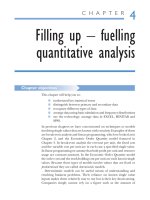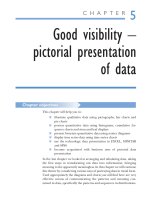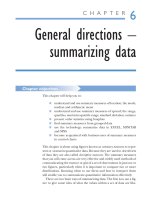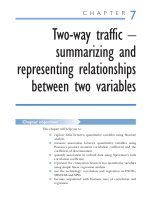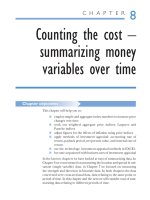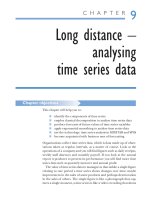Research methods for business 5th ch6
Bạn đang xem bản rút gọn của tài liệu. Xem và tải ngay bản đầy đủ của tài liệu tại đây (680.84 KB, 32 trang )
Slide 6.1
Chapter 6
Negotiating access and research ethics
Saunders, Lewis and Thornhill, Research Methods for Business Students, 5th Edition, © Mark Saunders, Philip Lewis and Adrian Thornhill 2009
Slide 6.2
Saunders, Lewis and Thornhill, Research Methods for Business Students, 5th Edition, © Mark Saunders, Philip Lewis and Adrian Thornhill 2009
Slide 6.3
Saunders, Lewis and Thornhill, Research Methods for Business Students, 5th Edition, © Mark Saunders, Philip Lewis and Adrian Thornhill 2009
Slide 6.4
Saunders, Lewis and Thornhill, Research Methods for Business Students, 5th Edition, © Mark Saunders, Philip Lewis and Adrian Thornhill 2009
Slide 6.5
Saunders, Lewis and Thornhill, Research Methods for Business Students, 5th Edition, © Mark Saunders, Philip Lewis and Adrian Thornhill 2009
Slide 6.6
Saunders, Lewis and Thornhill, Research Methods for Business Students, 5th Edition, © Mark Saunders, Philip Lewis and Adrian Thornhill 2009
Slide 6.7
Saunders, Lewis and Thornhill, Research Methods for Business Students, 5th Edition, © Mark Saunders, Philip Lewis and Adrian Thornhill 2009
Slide 6.8
Gaining access to data (1)
Physical access – key issues
• Organisations may not wish to allocate resources
• Requests for access may not be of sufficient interest
• Failure to reach those who can give permission
• Concerns about sensitivity and confidentiality
• Perceptions about the researcher’s credibility
• Doubts about the researcher’s competence
Saunders, Lewis and Thornhill, Research Methods for Business Students, 5th Edition, © Mark Saunders, Philip Lewis and Adrian Thornhill 2009
Slide 6.9
Gaining access to data (2)
Points to consider
• Access as an iterative process
• Obtaining consent from managers and participants
• Obtaining cognitive access
• The nature and extent of the required access
• Obtaining sufficient scope to answer the research
question
Saunders, Lewis and Thornhill, Research Methods for Business Students, 5th Edition, © Mark Saunders, Philip Lewis and Adrian Thornhill 2009
Slide 6.10
Gaining access to data (3)
Virtual access - four types of online community
• Bulletin boards for particular products or services
• Independent web pages
• Themed email lists
• Multiuser chat rooms
Adapted from Kozinets (2002)
Saunders, Lewis and Thornhill, Research Methods for Business Students, 5th Edition, © Mark Saunders, Philip Lewis and Adrian Thornhill 2009
Slide 6.11
Gaining access to data (4)
Checklist Box 6.8
Complete the Checklist in Box 6.8
to help you gain access
Saunders et al. (2009)
Saunders, Lewis and Thornhill, Research Methods for Business Students, 5th Edition, © Mark Saunders, Philip Lewis and Adrian Thornhill 2009
Slide 6.12
Strategies to gain access (1)
Areas for consideration
• Ensuring familiarity and understanding
• Allowing sufficient time
• Using existing contacts and developing new
ones
• Giving a clear account of purpose
Saunders, Lewis and Thornhill, Research Methods for Business Students, 5th Edition, © Mark Saunders, Philip Lewis and Adrian Thornhill 2009
Slide 6.13
Strategies to gain access (2)
Areas for consideration
• Overcoming organisational concerns
• Identifying possible organisational benefits
• Appropriate forms of communication
• Incremental access
• Establishing researcher credibility
Saunders, Lewis and Thornhill, Research Methods for Business Students, 5th Edition, © Mark Saunders, Philip Lewis and Adrian Thornhill 2009
Slide 6.14
Saunders, Lewis and Thornhill, Research Methods for Business Students, 5th Edition, © Mark Saunders, Philip Lewis and Adrian Thornhill 2009
Slide 6.15
Saunders, Lewis and Thornhill, Research Methods for Business Students, 5th Edition, © Mark Saunders, Philip Lewis and Adrian Thornhill 2009
Slide 6.16
Research Ethics (1)
Definition
‘The appropriateness of your behaviour in
relation to the rights of those who become
the
subject of or are affected by your work’
Adapted from Saunders et al. (2009)
Saunders, Lewis and Thornhill, Research Methods for Business Students, 5th Edition, © Mark Saunders, Philip Lewis and Adrian Thornhill 2009
Slide 6.17
Saunders, Lewis and Thornhill, Research Methods for Business Students, 5th Edition, © Mark Saunders, Philip Lewis and Adrian Thornhill 2009
Slide 6.18
Saunders, Lewis and Thornhill, Research Methods for Business Students, 5th Edition, © Mark Saunders, Philip Lewis and Adrian Thornhill 2009
Slide 6.19
Research Ethics (2)
Ethical issues at different stages of research
Source: Saunders et al. (2009)
Figure 6.1 Ethical issues at different stages of research (part 1)
Saunders, Lewis and Thornhill, Research Methods for Business Students, 5th Edition, © Mark Saunders, Philip Lewis and Adrian Thornhill 2009
Slide 6.20
Research Ethics (3)
Ethical issues at different stages of research
Source: Saunders et al. (2009)
Figure 6.1 Ethical issues at different stages of research (part 2)
Saunders, Lewis and Thornhill, Research Methods for Business Students, 5th Edition, © Mark Saunders, Philip Lewis and Adrian Thornhill 2009
Slide 6.21
Research Ethics (4)
Two philosophical standpoints of business
and management research
• Deontological
• Teleological
Saunders, Lewis and Thornhill, Research Methods for Business Students, 5th Edition, © Mark Saunders, Philip Lewis and Adrian Thornhill 2009
Slide 6.22
Research Ethics (5)
Research conduct is affected by
• Code of ethics
• Research ethics committees
• General ethical issues
• Netiquette
Saunders, Lewis and Thornhill, Research Methods for Business Students, 5th Edition, © Mark Saunders, Philip Lewis and Adrian Thornhill 2009
Slide 6.23
Research Ethics (6)
Issues during design and gaining access
• Obtaining consent - implied and informed
• Using participant information sheets
• Consent for observation and online observation
Saunders, Lewis and Thornhill, Research Methods for Business Students, 5th Edition, © Mark Saunders, Philip Lewis and Adrian Thornhill 2009
Slide 6.24
Research Ethics (7)
The nature of participant consent
Source: Saunders et al. (2009)
Figure 6.2 The nature of participant consent
Saunders, Lewis and Thornhill, Research Methods for Business Students, 5th Edition, © Mark Saunders, Philip Lewis and Adrian Thornhill 2009
Slide 6.25
Research Ethics (8)
Issues during data collection
• General issues applying to techniques
• Awareness of participant’s rights
• Keeping to the project aims
• Safety of the researcher
Saunders, Lewis and Thornhill, Research Methods for Business Students, 5th Edition, © Mark Saunders, Philip Lewis and Adrian Thornhill 2009



